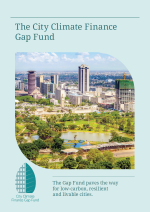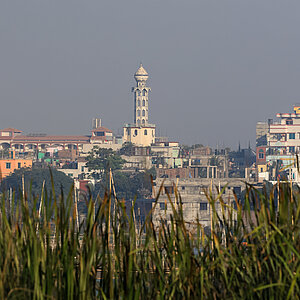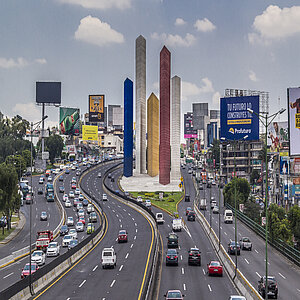Urban climate action: the Gap Fund turns one

Since its launch in September 2020, the Fund has already approved technical aid for 33 cities in Africa, Asia, Eastern Europe and Latin America.
Cities are already responsible for roughly 70 percent of global CO2 emissions. And they continue to expand: by 2050, two in three people will live in a city, with urbanisation now proceeding especially rapidly in the Global South. Cities are therefore key actors in efforts to combat climate change.
While many cities have plans for climate action, they often lack the resources and capacities to implement infrastructure projects for mitigating greenhouse gas emissions and adapting to climate change impacts – especially in the early phases of project preparation.
The City Climate Finance Gap Fund (Gap Fund) is the first global fund that closes this gap and provides support to cities in the initial phases of project development.
Gap Fund celebrates its first anniversary
The Gap Fund turned one: since its launch in September 2020, the Fund has already approved technical aid for 33 cities in Africa, Asia, Eastern Europe and Latin America. This support covers a wide range of urban sectors.
In San Miguelito (Panama), for example, climate-friendly and energy-efficient cable cars are being investigated as a way to reduce emissions that would also remain operational in the event of flooding.
In Dakar (Senegal), low-carbon, climate-resilient ideas are being integrated into the planning, development and construction of inexpensive and environmentally friendly accommodation.
In Ukraine, the city of Vinnytsia is using the Gap Fund to support measures for climate change adaptation along the Southern Bug river, including vegetation on embankments, river channel alteration using beaches and bridge-building for more attractive walking routes.
Support for another 30 cities is now at the approval stage.
Together with the Global Covenant of Mayors (GCoM) and Luxembourg, the BMU was a key co-founder of the Gap Fund. Currently, the BMU provides EUR 25 million of support to infrastructure projects via the Gap Fund, with a further EUR 30 million being provided by the German Federal Ministry for Economic Cooperation and Development (BMZ) and Luxembourg.
Yet the Gap Fund has set its sights higher than this, aiming to achieve a funding budget of EUR 100 million to support investments totalling around EUR 4 billion.
Effective cooperation for maximum effect
The Gap Fund is a unique funding vehicle: financed by Germany and Luxembourg, the Fund is managed by the World Bank and the European Investment Bank in partnership with Deutsche Gesellschaft für Internationale Zusammenarbeit (GIZ), who also work closely together with the Global Covenant of Mayors (GCoM), ICLEI, C40 and the Cities Climate Finance Leadership Alliance (CCFLA).
These joint efforts have worked to raise awareness of the importance of cities as part of the global climate agenda – and not before time: the most recent IPCC report has confirmed that cities are important drivers of global heating and estimates the climate finance gap at several trillion USD, with more funding needed especially in South Asia and Sub-Saharan Africa.
The Gap Fund also supports capacity building and the development of instruments and recommendations at local and national level, such as in the State of Cities Climate Finance Report. A number of practical tools have also been developed for project developers in the field. Overall, the Gap Fund accordingly makes a key contribution to adaptation and mitigation in urban infrastructure projects, and will continue to expand its support by extending funding to additional cities in the years to come.
The link has been copied to the clipboard
Contact
IKI Office
Zukunft – Umwelt – Gesellschaft (ZUG) gGmbH
Stresemannstraße 69-71
10963 Berlin














